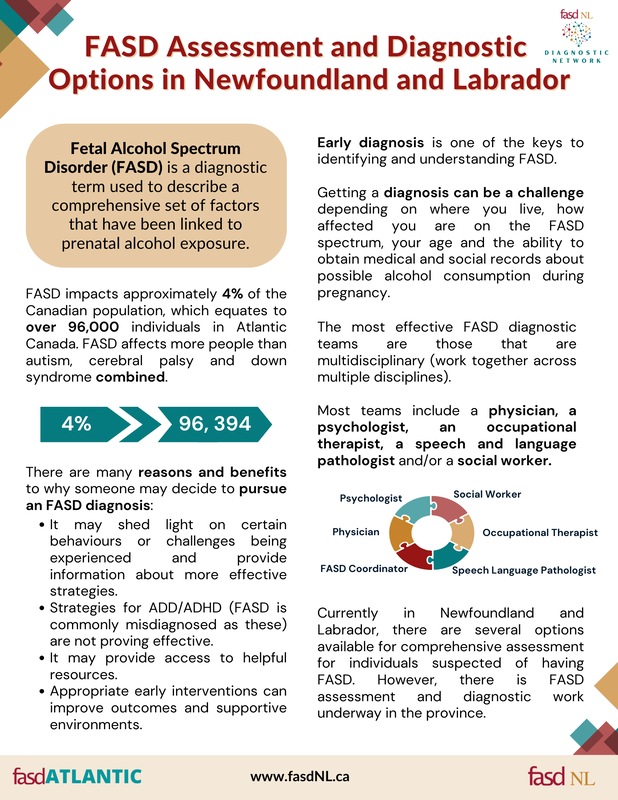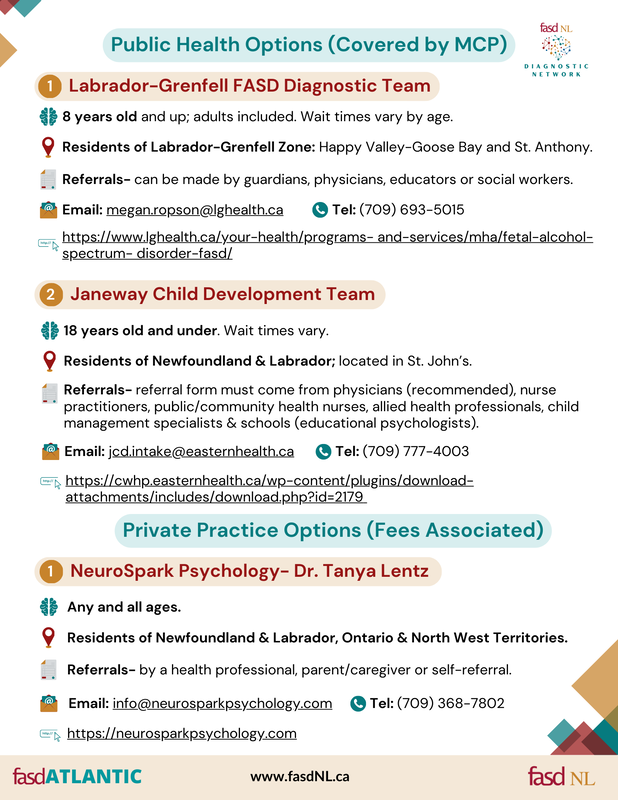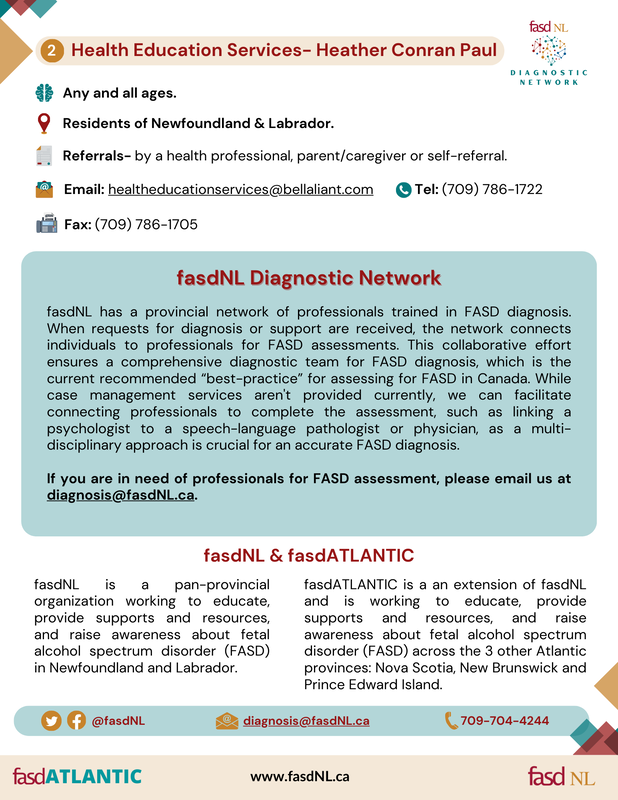NEW! - FASD Assessment & Diagnostic Options in Newfoundland and Labrador
Click a photo to download the document.
Screening for FASD
A national screening tool kit for children and youth identified and potentially affected by FASD has been developed by CAPHC and has been released for wide distribution. The authors of the tool kit have indicated:
"It is extremely important that screening is never used as a substitute for full assessment and diagnosis. Screening tools are not perfect and can only predict the likelihood that a child or youth is at-risk for FASD. Misuse of screening tools has the potential to stigmatize individuals and families and runs contrary to the ethical dictate to ‘do no harm’.
Similarly, screening should not be done where there is no access to diagnostic services or in areas where the capacity for diagnosis is so limited that an individual must wait a long time to be seen. In these situations, screening is likely to become a ‘de facto’ diagnosis and not serve the needs of the child or youth.” (Taken from FASD Screening Toolkit)
"It is extremely important that screening is never used as a substitute for full assessment and diagnosis. Screening tools are not perfect and can only predict the likelihood that a child or youth is at-risk for FASD. Misuse of screening tools has the potential to stigmatize individuals and families and runs contrary to the ethical dictate to ‘do no harm’.
Similarly, screening should not be done where there is no access to diagnostic services or in areas where the capacity for diagnosis is so limited that an individual must wait a long time to be seen. In these situations, screening is likely to become a ‘de facto’ diagnosis and not serve the needs of the child or youth.” (Taken from FASD Screening Toolkit)
Getting a Diagnosis
An early diagnosis is one of the keys to success. Understanding FASD, using effective strategies and accessing interventions can lead to the best possible outcomes for an individual with FASD.
Getting a diagnosis can be a challenge depending on where you live (in other words, who can make a referral or a diagnosis in your area), the level of impact, your age and the ability to obtain medical and social records about possible alcohol consumption during pregnancy.
Getting a diagnosis can be a challenge depending on where you live (in other words, who can make a referral or a diagnosis in your area), the level of impact, your age and the ability to obtain medical and social records about possible alcohol consumption during pregnancy.
Reasons for Getting a Diagnosis?
There are many reasons why people may pursue a diagnosis for FASD:
● It may shed light on certain behaviours or challenges being experienced… and similarly suggest better and more effective strategies.
● Strategies for ADD/ADHD (commonly given diagnosis) are not proving effective.
● It may provide access to helpful resources.
● Appropriate early interventions can improve outcomes and supportive environments.
● It may shed light on certain behaviours or challenges being experienced… and similarly suggest better and more effective strategies.
● Strategies for ADD/ADHD (commonly given diagnosis) are not proving effective.
● It may provide access to helpful resources.
● Appropriate early interventions can improve outcomes and supportive environments.
Newfoundland and Labrador Public Health (Covered by MCP)
Janeway Child Development Team
Eligibility for assessment:
Email- [email protected]
Telephone- 709-777-4003
Website- https://cwhp.easternhealth.ca/wp-content/plugins/download-attachments/includes/download.php?id=2179
Labrador-Grenfell Health Region - FASD Diagnostic Team
Eligibility for assessment:
Email- [email protected]
Telephone- 709-693-5015
Website- https://www.lghealth.ca/your-health/programs-and-services/mha/fetal-alcohol-spectrum-disorder-fasd/
Eligibility for assessment:
- Under 18 years old. Wait times vary.
- Residents of Newfoundland & Labrador; located in St. John’s.
- Referrals- referral forms must come from physicians (recommended), nurse practitioners, public/community health nurses, allied health professionals, child management specialists & schools (educational psychologists).
Email- [email protected]
Telephone- 709-777-4003
Website- https://cwhp.easternhealth.ca/wp-content/plugins/download-attachments/includes/download.php?id=2179
Labrador-Grenfell Health Region - FASD Diagnostic Team
Eligibility for assessment:
- 8 years old and up; adults included. Wait times vary by age.
- Residents of Labrador-Grenfell Zone: Happy Valley-Goose Bay and St. Anthony.
- Referrals- can be made by guardians, physicians, educators or social workers.
Email- [email protected]
Telephone- 709-693-5015
Website- https://www.lghealth.ca/your-health/programs-and-services/mha/fetal-alcohol-spectrum-disorder-fasd/
Private Practice Options (Fees Associated)
NeuroSpark Psychology
Dr. Tanya Lentz, R. Psych.
Eligibility for assessment:
Email- [email protected]
Telephone- 709-368-7802
Website- https://www.neurosparkpsychology.com
Health Education Services Inc.
Heather Paul, R. Psych.
Eligibility for assessment:
Email- [email protected]
Telephone- 709-786-1722
Fax- 709-786-1705
Dr. Tanya Lentz, R. Psych.
Eligibility for assessment:
- Any and all ages.
- Residents of Newfoundland & Labrador, Ontario & North West Territories.
- Referrals- by a health professional, parent/caregiver or self-referral.
Email- [email protected]
Telephone- 709-368-7802
Website- https://www.neurosparkpsychology.com
Health Education Services Inc.
Heather Paul, R. Psych.
Eligibility for assessment:
- Any and all ages.
- Residents of Newfoundland & Labrador.
- Referrals- by a health professional, parent/caregiver or self-referral.
Email- [email protected]
Telephone- 709-786-1722
Fax- 709-786-1705
Diagnostic Teams
The most effective diagnostic teams work together across disciplines. Most teams consist of a physician, psychologist, occupational therapist, speech and language pathologist and a social worker, but will vary in composition depending on your area and access to resources.
(Recommended by the Canadian FASD Diagnostic Guidelines)
(Recommended by the Canadian FASD Diagnostic Guidelines)
About |
Resources |
© COPYRIGHT 2024. ALL RIGHTS RESERVED.
|



